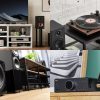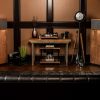Based on the responses to my recent articles on what ails the audiophile community, it would appear that my thoughts hit too close to home for some. The comments were a mixed bag of agreement and vitriol; and were a highly illustrative microcosm of exactly what I was referencing.
The most colorful vitriol came from those who have decided that I am an abject (the horror, the horror) subjectivist who doesn’t believe that measurements matter. A quick search of my reviews would have made those same people realize that I am not going to fit cleanly into either of those two camps.
My hope is that clarifying my position will help others understand that my goal is not to make this personal and not to pick a winning side. If you love music and better sound quality — you are already on the winning side.
I’d love to see a community where we can disagree civilly and focus on the things that help us move forward in this hobby.
This is a hobby, remember?
Censorship is never going to work but civility needs to be the guiding principle.
If you think bashing a product or another audiophile who likes that particular product makes you some kind of savior of our sacred realm — check your stupidity and arrogance at the listening room door.
I believe measurements can tell us a lot and I do think they are both useful and needed.
However; I do not think they are capable of telling us everything we need to know. And some things are so dependent on external factors that measurements mean little as temperature, humidity, the shape of the human ear, the size of the room, objects immediately around the listener, and many other items too numerous to mention here will never be exactly as they were during the measurement test.
They are at best in those cases, approximations of what one might expect and at worst entirely misleading.
I am also not willing to trust my ears entirely as auditory memory is exceedingly short and A/B testing is extremely difficult to do well without a team helping (it is almost impossible to blind test speakers by yourself).
I do think an awful lot of what people hear can be chalked up to what they want to hear for a variety of reasons when doing such testing. While some will point to switch boxes or other devices that make it easier to A/B test, those too can add additional noise and distortion to the mix.
There are a number of reasons why I can’t sit completely in either camp.
I’ll start with measurements but promise to give equal time to subjectivism so stay with me even if you don’t like what I have to say — I’m speaking directly to the Audio Science Review crowd.
Even the simplest of measurements done by hobbyists are dependent on how well calibrated their gear is and how accurate and precise those instruments are. It has long been warned that frequency response charts made on one system cannot be compared to those made by different systems.
Even with proper calibration, graphs I have done will parallel the curves of graphs published by Head-Fi or ASR but not directly overlay them. The shape is the same but minor differences almost always exist.
I’ll be the first to admit that both Jude and Amir are likely better at it, have more money invested than I do in proper testing equipment, and have more practice doing it.
The fact that their two graphs don’t agree entirely though leads me to the conclusion that even among experts with high end measurement systems there is no real consensus, and one could rightly question why there are these differences in their reporting.
Other questions about measurements center on the statistical analysis of those measurements. How many times is a test run to calculate a result? If the same test is run 10 times consecutively do we get exactly the same result or is there variance?
What is the margin of error? If a SINAD measurement has a ±2% margin of error, then items between 110 and 114 dB may all actually perform exactly the same since the item rated at 110 dB may have a 2% error to the negative and the item with the 114 dB rating may be an equal amount off in the opposite direction (roughly 110 dB + 2 dB; 114 dB – 2 dB).
Again, these numbers are bantered around like gospel but without context. They mean little and can be misleading as a result.
When was the last time you saw a measurement session documented that listed how many times the tests were performed, the raw data and the averages, and the calculated margin of error for those tests disclosed?
Sometimes measurements are misrepresented accidentally because of differences in language, translations, or just plain differences in our understanding of what each measurement means.
Take power output as one example. Some will say that looking at the milliwatts of output of an amplifier at a given impedance is basically all you need to know in order to calculate how well a headphone can be driven by that amplifier.
Others argue that since wattage is a calculation based on current and voltage, you really need to know the component parts that make up that value to be able to determine how well the amplifier is suited to work with a particular headphone.
Averages are often stated and yes, the Harman curve is a big one. By using averages we increase the likelihood that a product is suited to a large group people but very few of us are fit perfectly in that average.
As an example, I used 10 years of test grades from a local institution and compared students actual grades to the average; only 3% of the time in that ten year period did a student score exactly the average grade on any given examination. In many cases, the act of averaging the data made it impossible to score exactly the average.
An average may provide a rough estimate of individual performance, but it rarely is a match to actual performance.
And then there is the fact that science as we know it changes daily as new discoveries are made about the human brain, hearing, how sound waves are propagated through various media, and the technology available to us evolves.
Over the millennia, we have been sure that the Earth was the center of the universe, spontaneous generation occurred (rotting food gives rise to maggots), the universe was stationary, and mass was lost during chemical reactions.
These were not ideas proposed by ignorant men, with most being proposed by some of the most renowned minds of their day. The Stationary Universe Theory was put forth by none other than Einstein himself, only to be proven wrong by Hubble.
My point is that science is the best that we understand the universe around us today, but that is subject to change as we move forward. Saying “this cannot be true because science says…” is denying that science evolves.
Sure it may not seem true based on what we know, but even the law of gravity is subject to exceptions that were not known in Newton’s day.
And now for the flip side of the argument.
I cannot be a subjectivist solely, because I see too many flaws and fallacies being used to justify statements.
You Can’t Prove Me Wrong, So I Am Right…
The burden of proof always lies with the person making the claim and too often the follow-up to this first bit of nonsense is, “just because you can’t hear it doesn’t mean it isn’t there” to which I would say, ”just because you think you hear it, doesn’t mean it is either.”
The first argument; “you can’t prove me wrong, so I am right” is Argumentum ex Silentio or to argue from silence. As the phrase suggests, it has been going on since the days of ancient Rome, and says if current sources cannot speak to a question it proves a person’s claim.
The problem being is that it works equally well in both directions. “Science can’t prove God exists, so he doesn’t,” is equally valid when compared to “Science cannot prove God doesn’t exist, so he does.”
My example may be seen as extreme, but it shows the fundamental problem with arguments from this position.
Secondly, the “just because you can’t hear it” line of thinking automatically assumes the claimant is in a better position to judge than the other person in the conversation without presenting any evidence to support the claim and it relies on a sample size of two.
To prove a hypothesis, a result must be repeatable and that pretty much precludes using only the sample size of “you.”
EIC Ian White would argue that the only opinion that matters is your own based on your own listening experience and that audiophiles should just buy more music and enjoy the hobby. You either like how the music sounds in your own specific listening space or you don’t. Nothing else should matter.
When presumed differences in a listener’s capabilities are called into the argument it seems scrutiny is always placed on those who don’t believe but never on those who do. If 99 out of 100 people don’t hear a difference and you do, chances are your hearing is not better; you have a problem — time to get it checked.
Another problem I have is the confusion between different and better. Changing a component may indeed result in differences in the sound. Swap your speaker wires for a single 28 gauge strand of copper (easy and cheap to get, just use 1 strand of an Ethernet cable) and you will almost invariably change the sound because resistance and impedance is raised considerably.
But what makes that change “better?”
There is an age-old fallacy known as confirmation bias that comes into play here. If we paid more for it, and we hear a difference, it must inherently be an improvement because we expect spending more money to equate to a better outcome.
We are conditioned to think “you get what you pay for” but in audio it is entirely possible to get a whole lot less.
Blind belief that any change is improvement is a sure way to part with a lot of your hard earned cash. As an example, some manufacturers have started intentionally introducing distortion (second order harmonics) to tones below 100Hz in their smaller Bluetooth speakers because it adds what we perceive as greater bass impact.
This is done because small drivers struggle to produce deep bass. The most common way to improve low end response is to increase size of the driver, size of the vent, and size or the cabinet.
None of these options are really that practical when designing a portable speaker so designers have to resort to other means. Does this really result in something that is better?
When we don’t have common definitions of what is better, or improved, it is near impossible to state unequivocally that any change results in an improvement, but instead only that it results in change.
Cult of Personality
There are two other camps in the audiophile community that push people away. If you believe that a single person is the ultimate source of the truth; whether it is a successful designer, reviewer, or forum moderator — and you are willing to die on that hill defending their positions, you are no longer thinking for yourself.
Trust your own ears. Why would anyone blindly follow the conclusions of anyone who has never engineered a single respected or successful piece of audio or video equipment.
Even the best designers release the occasional dud, but to think that someone with a fancy lab of test & measurement equipment knows more than them is a weird line of logic to follow.
I would also recommend that people new to the hobby ignore the bandwagon jumpers on most A/V websites.
When you surround yourself with only people who believe the same things you do, chances are, you are going to have those views reinforced, and believe they hold more validity than they do. If you only frequent one forum, or one site, and it has a reputation for being objectivist or subjectivist, chances are what you are reading already has a bias and you are inheriting it.
We have fanaticism on both sides of the aisle and that isn’t good science as fanatics tend to overvalue things that support what they already believe and discount the things that differ from their viewpoint.
Failing to give all the evidence equal weight makes us look no different than the sports fan who screams at you online that their team is going to win the Stanley Cup when they currently sit in last place.
Online trolls love to ask hot button questions that they know will create a fight and our best defense is to just ignore them. Our hobby has a lot to offer people but we have to question our behavior when it continues to polarize or scare people away.
Happy New Year.
Continue reading:
← Part 1: The Audiophile Community has a Problem
← Part 2: The Audiophile Community has a Problem







































David
December 27, 2021 at 3:45 pm
Not everything that can be counted counts and not everything that counts can be counted. The measurements people really need to take a hard look at what passed for ‘undisputed truth’ in chemistry, physics, biology, etc. as recently as 25 years ago to realize how foolish reliance on ‘so called scientific evidence’ can be.
Tim
January 1, 2022 at 11:26 am
100% agree. We have barely scratched the surface when it comes to really understanding sound.
Sites like ASR have gamified reviews, to the detriment of the community. And the adherents don’t understand that they are the ones being played. It would be funny if there wasn’t also such a toxic agenda to destroy reputations in the process.
rl1856
December 27, 2021 at 5:22 pm
Effective reviewing of audio components should involve both objective and subjective evaluations. Testing can lead us in many directions, some of which are directly related to how a given product will sound. Does an amplifier square wave exhibit overshoot or ringing ? Both are audible. Is an amplifier stable into a sub 4ohm load and does it deliver multiples of rated power into low impedance loads ? If no to both, then be careful using this amp to drive a demanding speaker. Are your speakers inefficient, and a demanding load ? If so, then a low power SET amp may not be a good choice. What is the effective mass of a tone arm ? If low, then you may want to review your decision to install a heavy low compliance MC cartridge. All of the objective information referenced above helps us to identify *possible* matches between components. But a true match, where components complement each other, requires subjective evaluation. Meaning if one wants to fully evaluate a component or a system, one has to embrace both sides- Ying and Yang. Unfortunately too many in this hobby consider each side to be an absolute, when the reality could not be farther from an absolute.
Tim
December 27, 2021 at 7:44 pm
I would challenge measurement purists to listen to a piece of gear blindfolded, and make an assessment of its quality *before* they see any graphs. I’d bet 90%+ couldn’t tell 110 Sinad from 80 Sinad in a typical listening room. I have sought out measurement data when something has sounded off to me, or extremely right (to learn about the voicing characteristics that are likely to please me). The folks who say they only buy gear based on measurements are tragic to me, and imo aren’t really audiophiles.
jeff henning
December 27, 2021 at 8:32 pm
A few thoughts:
• Amongst mammals, human hearing is not even close to the best
• The best amps in the world (all are solid state) have distortion and noise too low for humans to hear. Any small differences that can be heard between them can be attributed to how that amp deals with the reactive load of the passive speakers they are driving. That will only show up in the frequency response of the system.
• Unless you have a listening room with fantastic acoustics, stand mounted-speakers and multiple subs will offer better performance than huge towers.
• Loudspeakers are drastically better today than they’ve ever been (including well-designed cheap ones)
• Well-designed, fully active speakers will always outperform passive designs of the same general configuration… there is a reason why, in most studios, actives rule the roost
• The passive loudspeaker crossover has gone as far as it can go. Nothing can be done to improve it unless they find materials that don’t behave according to current laws of physics.
• DSP can’t solve crappy acoustics, but, in a good room, DSP can make a system close to perfect in every way.
• The weak links in the recording/playback chain have always been the transducers… the microphones and loudspeakers. They still are.
• Vinyl records and tube power amps can no longer be considered high fidelity
Very few audio engineers on the planet would argue with even one of these statements.
Ian White
December 27, 2021 at 10:29 pm
Jeff,
“Vinyl records and tube power amps can no longer be considered high fidelity.”
But I’ll never stop listening to vinyl with my tube amps.
Ian White
cin
December 29, 2021 at 2:47 pm
I would argue with who has the best hearing as we really have no clue. Hearing is a complex process that is more than just sentitivy and frequency range. It’s also the ability to extract details out of complex sound fields.
John
December 28, 2021 at 12:29 pm
I like your thinking. Any chance you are going to CES?
Ian White
December 28, 2021 at 2:54 pm
John,
We’re covering CES virtually this year. Two of our staffers are in California but didn’t feel comfortable attending under the current circumstances.
Not to worry though – we already have 8 articles scheduled for Day 1.
Expect to see 30-40 articles from us during CES.
Best,
Ian White
Tim
December 28, 2021 at 2:04 pm
One more thought: to people who still don’t get it, seek out amir’s trashing of the Bluesound Node, from August. Right at the top, headless panther! Oh look, boys, fight fight fight! He bases this entirely on a harmonic that appears at -90 dB! Red zone! Worst thing ever!! That unit, by his own measurements, measures brilliantly. He’s too dumb to use the simple app, and whines that there’s a firmware update. And somebody’s going to tell me this toxic jackass is a trustworthy source? And yet, the dittohead acolytes are there, calling it a doorstop. No. Objectively, factually, morally, metaphysically, scientifically FALSE. There’s a reason why this creep has been banned from other sites and forums.
Ian White
December 28, 2021 at 2:59 pm
Tim,
I’ve reviewed all of the Node Series and own 2 of them. I actually listen to products before I decide to trash them.
I find it bizarre when people trash companies like NAD or Bluesound as if they have one guy in the lab in Toronto just sticking random parts inside the boxes.
There is so much engineering that goes into these components and testing. Lenbrook is a test and measure company and they don’t manufacture anything unless it’s up to their standards. Paul Barton (PSB) also works on the NAD headphones and Bluesound wireless speakers and he’s fanatical about testing.
Ian White
Tim
December 28, 2021 at 4:59 pm
But Ian, listening is the problem, don’t you know? Only the twitchy scribbles from the Gospel of Amir contain the truth. Repent! Repent!
Ian White
December 28, 2021 at 6:10 pm
Tim,
I find your lack of faith, disturbing.
I sold my soul to the dark side many years ago. EL34s with British bookshelf speakers.
Ian White
DarseZ
December 29, 2021 at 12:15 pm
I’m just a passer by here but it’s great to see some important issues addressed head on that is only hurting the community…adversarial tone, minimizing the opinions of women, silly arguments, elitism.
I’ll listening to music i like on whatever device is handy… Which can be a phone, a cheap Bluetooth speaker, a nice system, whatever.
It’s about the music and how it sets the tone of a space, whatever is happening. And in my opinion has a lot less to do with equipment than we may think.
Cook, work, dance, laugh, live, with whatever is handy. The memories of the moment are what matter.
Ian White
December 29, 2021 at 4:28 pm
DarseZ,
“It’s about the music and how it sets the tone of a space, whatever is happening. And in my opinion has a lot less to do with equipment than we may think.”
Thank you.
Ian White
Rudy
December 29, 2021 at 2:39 pm
I like to call that “Listening with your measurements, not your ears.” I’m waiting for some high-end companies with deep pockets to file a defamation suit against that hack. The DAC I own now (brand/model irrelevant for our discussion) is the only one I’ve heard that makes many of the digital recordings I own sound good, and many other owners agree. Naturally, our guy amir hated it since there were one or two measurements he didn’t like, and all of his parrots are preaching his gospel and putting it down as the Worst Thing Ever, and that thought still remains in the back of many peoples’ minds even if they don’t follow that hack’s gospel. “I heard that X measured bad in that DAC. I would never own it!” Guys like this are a poison in the community. And worse are those who follow him blindly and repeat his nonsense. I personally take a balanced approach as this blog post’s author does–measurements only tell a small part of the story, but it’s the SOUND that counts.
Ian White
December 29, 2021 at 4:26 pm
Rudy,
Imagine hating anything based on how it “measured.”
Versus the actual experience of listening to it.
Boggles the mind.
Ian White
cin
December 30, 2021 at 3:20 am
You sound triggered. What are they going to sue him for? Telling the truth? This article is about people like you and you don’t even realize it.
Ian White
December 30, 2021 at 12:12 pm
Cin,
You sound defensive. Nobody is suing anybody.
I have a very simple question. Does the ASR crowd actually listen to any of the equipment that is under test or does it go completely by the measurements?
You wrote in another comment that “no listening is needed,” which pretty much confirms what I thought.
Best,
Ian White
Tim
December 31, 2021 at 1:19 pm
“Truth.” There you go. You have confused data with the interpretation thereof. You are hereby ordained into the cult.
cin
December 29, 2021 at 2:57 pm
-110 and -114db are not 2% apart. One should not expect measurements to perfectly overlay except with the same unit at the same temperature. ASR for amps at least looks at performance wrt warm-up if it is an issue. The AP already has a function of averaging on any given sweep. You can increase the averaging but you still only need 1 sweep to report.
Judging by the acrimonious comments wrt to ASR in these comments I suspect many of your readers didn’t take the articles to heart.
Tim
December 31, 2021 at 1:28 pm
Cin, ASR is neither objective nor particularly scientific. Reviews start off with a visual cue, the panther, to alert the faithful as to a subjective interpretation of the results. Once you buy that gimmick, you’re hooked. Then we read commentary about design, ergonomics, app, etc, which is all purely subjective and is wildly inconsistent from product to product like everything else about the site. Then we see measurements, that are annotated with subjective comments, and further reinforced with more snarking. The fig leaf of scientific propriety IS the con for this guy’s bitter, self-serving agenda. You may know more about AP functions but I’d wager I know more about rhetoric, propaganda, and gaslighting.
Chris
December 28, 2021 at 2:54 pm
The lede is the thing I hold as true: it’s a hobby. Much like watch collecting; it’s fun to argue about manufacturing, price, accuracy etc etc., however, the best advice I ever received wad, “Do you like it?” Same goes for audio, if you like how it sounds then that’s the sound for you.
Chris
December 28, 2021 at 2:55 pm
*was
Ian White
December 28, 2021 at 3:02 pm
Chris,
I think my sentence in Will’s piece is exactly that.
“Does it sound good to YOU?”
Unless all of the other people telling you it sucks live in your home and listen to your system — their opinion is nothing more than that. Their opinion.
Ian White
Catherine Lugg
December 28, 2021 at 3:49 pm
Thank you for this series. I will also add a bit of a lament. Why do ALL reviewers presume we are all able-bodied??? Some of us can’t use heavy equipment, period (must be around 25 pounds or less). And some of us need hearing aids (buy these first IMHO). I think the “fights” are a way of doing “boundary maintenance,” shutting out people who have no time or energy for counting angels on the head of a pin. Thank you again for a bit of sanity.
W. Jennings
December 28, 2021 at 4:40 pm
You are very welcome. I think, much like many other things, the vast majority of people in this community are good. We just can’t seem to keep the worst among us from also being the loudest and most visible. I’ve had the opportunity to meet lots of great people in this hobby and I know they far outnumber the trolls, fanatics, and loons out there. If the silent majority will make it a point to be less silent when they don’t agree with bad behavior, maybe we can reclaim our hobby from those who would make it a pissing contest.
W
Marc Darrow
December 28, 2021 at 4:51 pm
I appreciate the way your article focused on the process of how we, as a group, focus on the content that the other commenters have discussed. To me, the issue/problem isn’t whether measurements or anything else matter or don’t matter. It’s about how we deal with discussions. disagreements, proposing our points of view, etc. This is where we could shift our culture to a more civil/compassionate approach.
Let’s say you think another audiophile forum member is completely deluded about the value of cables, perhaps some other deficit or problem seems to you to be behind their perspective. Do you relate to them the same way you’d relate to a mentally ill person who expresses his delusions at a family gathering? Are we mean to people we think are ignorant, stupid, or conditioned by the media to believe something specious? Perhaps some of us are, but I think most posters who are adversarial or insulting online feel free to do so in a way they wouldn’t out in the world. I can think of reasons why, but my point is that if we live true to our own value system in all contexts, we’ll feel better about ourselves, and ,of course, others will benefit, as well.
Ian White
December 28, 2021 at 6:09 pm
Marc,
“Are we mean to people we think are ignorant, stupid, or conditioned by the media to believe something specious? Perhaps some of us are, but I think most posters who are adversarial or insulting online feel free to do so in a way they wouldn’t out in the world.”
Spend a lot of time on Twitter?
I think your last point is dead on.
Ian White
marc darrow
December 28, 2021 at 6:37 pm
Ian: I’ve never twittered or facebooked, and I hesitated to join forums for quite some time. With no access to others’ context, backstory, visual cues, etc, I felt at the mercy of remarks I couldn’t decode well.
Ian White
December 28, 2021 at 8:07 pm
Marc,
Not a lot of audio/hi-fi banter on Twitter but otherwise a cesspool. I’ve been banned 3x and deleted my account 4x in 10 years.
IG shows the most promise for attracting new audiophiles.
Facebook has not seen my shadow for many years.
I don’t belong to/use any audio forums. Too much antiSemitism over the years.
Ian White
Scott Wheeler
December 28, 2021 at 6:52 pm
I think you may be conflating a few things here. I am a subjectivist but I do believe that for any audition or comparison to be remotely reliable it has to be done under blind protocols and with quick switching. I also believe that measurements can tell us pretty much everything there is to know about how a component sounds.
Ian White
December 28, 2021 at 7:56 pm
Scott,
“I also believe that measurements can tell us pretty much everything there is to know about how a component sounds.”
Except for how it sounds in the context of an actual system where components interact with one another.
Ian White
Scott M
December 28, 2021 at 10:57 pm
I appreciate this series of articles, very thoughtful and insightful. I am not much of an audiophile, certainly not by the standards of this august group. But I am an ear doctor and so like to think I know about about hearing, and a not particularly accomplished musician. Many of the measurable differences in stereo equipment are below the threshold for human detection, even in the best of circumstances. And subjective experiences absolutely matter—enjoying music is absolutely a subjective experience. What I would love to see covered more is the idea of value though. If x component will perform 1% better yet costs 10x as much, is that worth it? Or stated differently, how much would it be worth to get that last 1% of performance? Or the last 0.01%? Different people will have different thresholds but I tend to be more value focused than others—I can buy and enjoy a whole lot more music that way. Cheers.
Ian White
December 28, 2021 at 11:05 pm
Scott,
Welcome and I think you raise some interesting points about human hearing and value.
We don’t cover systems over $10,000 because we want to focus on “value” components. If you scroll down, check out the Audiophile System Builder column which is focused on building a system with a budget.
Best,
Ian White
W. Jennings
December 28, 2021 at 11:13 pm
I certainly agree that the law of diminishing returns is fully in play in audio but determining whether an item is “worth it” is a judgement I think best left to the person making the purchase. I try to say when I feel things are or are not a great value in my opinion but ultimately that decision is left to the reader.
WJ
Tim
December 29, 2021 at 1:28 pm
Hi Scott, you make excellent points. One overlooked fact is that audio gear are musical instruments. I’m sure someone with a chip on his shoulder could prove that a $25,000 1959 Les Paul sounds the same or worse as a clever copy at 1/100 the price, but so what? We imbue music with so much meaning and value in our personal lives that we want instruments that reflect that. Design, backstory, and brand image are all vital and actually enhance our experience, and there’s nothing wrong in that. One example I think of is Tekton. Great speakers, but judging by many comments I’ve read, I think they appeal to a lot of people who like them because they are austere, “anti-design” boxes that some of us think are unattractive. That becomes a point of pride for some, ie an aesthetic choice. I prefer knowing what psychological motivations are at work in my decisions whenever possible. Anyway, nice seeing you here.
DH
December 29, 2021 at 2:57 pm
Here’s my own take on the source of some of these debates, looking not so much at psychological sources but conceptual ones.
The video comes from a professional presentation to the Society for the Philosophy of Technology. It discusses three ways philosophical issues can underlay popular debates in audio: Objective measurement vs. subjective listening, Gear vs. Rooms/Environments, and Realism vs. Constructivism as an ideal for audio reproduction. Philosophy is not everyone’s bag, but so I submit this as possibly of interest: https://youtu.be/cWPSYLFxuPo
cin
December 30, 2021 at 3:31 am
I think most of the acrimony towards ASR is what they publish is somewhat irrefutable. They are measurements. They don’t lie they are not made up, and in the case of ASR made with some of the best equipment available. When they show an expensive DAC does a poor job at recreating a waveform it’s not really refutable. It does. When they show a $500+ USB cable makes no improvement over a $10 cable this is an irrefutable fact in their test. No listening is needed. No, your ears are not more sensitive to equipment for these tests. Audiophiles need to loose the arrogance and accept this. They also need to accept that their systems are not nearly as “resolving” as they think they are. I don’t care if you have $100k+ of equipment. If you don’t have substantial acoustics investments, no your system is not highly resolving.
Ian White
December 30, 2021 at 12:06 pm
Cin,
“No listening is needed.”
Then why do we buy hi-fi equipment? Because it measures well?
Thank you for making our point.
Happy New Year.
Ian White
Steve H
December 31, 2021 at 5:24 pm
It never occurred to you guys that audio writers are the problem. The hobby went the wrong direction in the seventies and drove the mainstream hi-fi market away. Subjective isn’t enough, the path of balanced examination of audio equipment was abandoned.
To evaluate audio equipment, you need to measure it, listen to reference albums and recordings then listen to variety of music.
For the hobby to survive it needs new writers capable of measuring audio equipment. Here is quick list people who need to go: anyone who wrote a positive or aggressive neutral article about MQA, anyone who wrote a positive review of the AudioQuest Cobalt and anyone who said analog has unlimited resolution.
Ian White
December 31, 2021 at 5:36 pm
Steve,
The hi-fi press is definitely guilty of some things (all of us), but nobody would know that the industry exists if not for the publications. You can’t refute that.
I agree that there needs to be a middle ground. Measurements (explained to people in words they can understand) have their place for sure. Along with subjective analysis.
You can’t put the Genie back in the bottle in regard to YouTube reviews which I think are a mixed bag. I watch only 1-2 channels and consider the rest fluff.
Relieved to know I’m only guilty of one offense.
Happy New Year,
Ian White